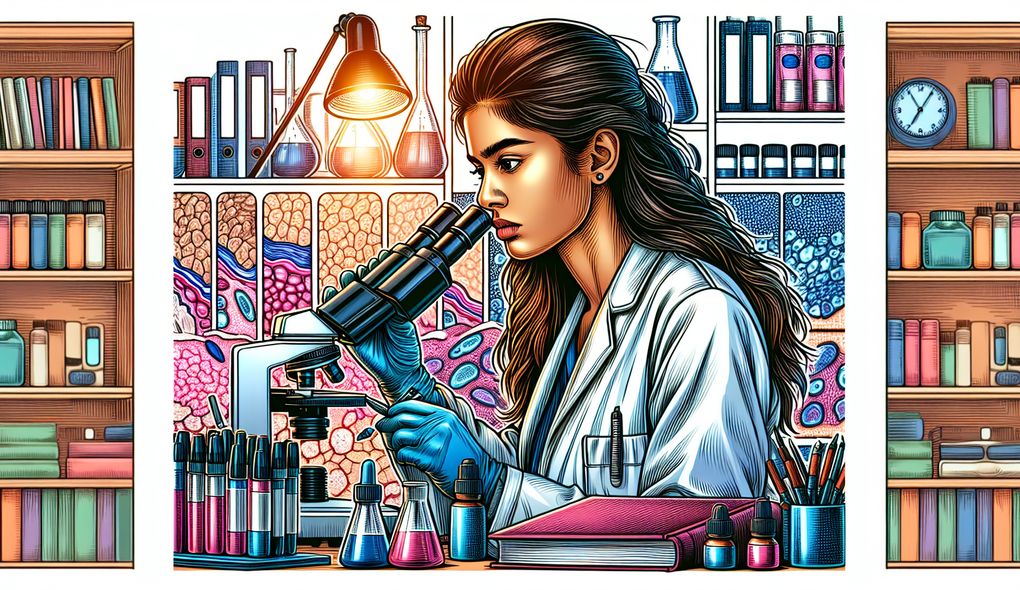What steps do you take to develop and improve your diagnostic skills?
JUNIOR LEVEL

Sample answer to the question:
To develop and improve my diagnostic skills, I take several steps. Firstly, I always stay updated with the latest research and advancements in dermatopathology. This helps me keep track of new diagnostic techniques and treatments. Secondly, I engage in continuous education by attending conferences, workshops, and seminars. This allows me to learn from experts in the field and gain new insights. Thirdly, I regularly participate in case consultations with other healthcare professionals to discuss challenging cases and learn from their experiences. Additionally, I practice self-reflection by reviewing my own cases and seeking feedback from senior dermatopathologists. Lastly, I utilize laboratory diagnostic equipment effectively and pay great attention to detail during microscopic examination. I believe these steps are crucial in developing and improving my diagnostic skills.
Here is a more solid answer:
To continuously develop and improve my diagnostic skills as a Dermatopathologist, I follow a systematic approach. Firstly, I stay updated with the latest research by reading scientific journals, attending conferences, and participating in online courses. By keeping abreast of advancements in dermatopathology, I ensure that my diagnostic techniques are current and effective. Secondly, I actively seek opportunities for professional development by engaging in regular case consultations with dermatologists and pathologists. These discussions help me enhance my analytical thinking and learn from the experiences of others. Additionally, I actively participate in quality control procedures within the laboratory to ensure accuracy and consistency in my diagnostic findings. Lastly, I have a keen attention to detail during microscopic examination, meticulously analyzing tissue samples to identify even the slightest abnormalities. This multifaceted approach, combined with my commitment to continued education and collaboration with healthcare professionals, allows me to continuously improve my diagnostic skills.
Why is this a more solid answer?
The solid answer expands on the basic answer by providing more specific details and addressing all the evaluation areas and job requirements. It emphasizes the importance of staying updated with the latest research, actively seeking professional development opportunities, participating in quality control procedures, and having a keen attention to detail.
An example of a exceptional answer:
Developing and improving my diagnostic skills is a top priority as a Dermatopathologist, and I take several proactive steps to achieve this. Firstly, I am involved in research projects related to dermatopathology, conducting studies to discover new diagnostic markers and refine existing diagnostic techniques. By actively contributing to research, I not only stay at the forefront of the field but also contribute to its advancement. Additionally, I actively mentor and supervise junior dermatopathologists, sharing my knowledge and experience to help them develop their own diagnostic skills. Furthermore, I regularly attend international conferences and workshops, not only to gain insights from renowned experts but also to present my own research findings and receive feedback from the global dermatopathology community. Moreover, I have implemented a system of continuous improvement by regularly reflecting on my own diagnostic decisions, seeking feedback from colleagues, and implementing changes based on new evidence. By adopting this holistic approach to developing and improving my diagnostic skills, I can provide the highest level of diagnostic expertise to patients and collaborate effectively with healthcare professionals.
Why is this an exceptional answer?
The exceptional answer goes above and beyond by highlighting additional steps taken to develop and improve diagnostic skills. It includes involvement in research projects, mentoring and supervision of junior dermatopathologists, active participation in international conferences, and a system of continuous improvement. These additional actions demonstrate a strong commitment to professional growth and contribute to the advancement of dermatopathology.
How to prepare for this question:
- Stay updated with the latest research in dermatopathology by reading scientific journals and attending conferences.
- Participate in online courses and workshops to enhance your knowledge and skills.
- Actively seek opportunities for case consultations with dermatologists and pathologists to learn from their experiences.
- Engage in research projects related to dermatopathology to contribute to the field and stay at the forefront of advancements.
- Consider mentoring and supervising junior dermatopathologists to enhance your own diagnostic skills and contribute to their development.
- Attend international conferences and workshops to gain insights from renowned experts and present your own research findings.
- Implement a system of continuous improvement by regularly reflecting on your diagnostic decisions, seeking feedback from colleagues, and adapting based on new evidence.
What are interviewers evaluating with this question?
- Knowledge of dermatopathology
- Commitment to continued education
- Collaboration with healthcare professionals
- Attention to detail

